with bated breath, grazed by the evening shower, we sought shelter

From the top of the sky to the bottom of the ocean, the balance bears their leitmotif. The clearest waves and their subtle compounding. A glistening star evoking a radiance you willingly dismiss. Azure immanence reigns true.
A room bathed in a soft, satin darkness. The setting sky painting the windows in hues of indigo and turquoise. The surfaces reflect the remnants of light left from the pale sun. Even the darkest of nights stay blue.
If the colors were ordained by God, heaven, too, might appeal to our meek understanding of the infinite. An ultramarine kingdom makes for an interesting visual, doesn’t it? Man was born in God’s likeness after all and maybe he fancies us a derivative mock up of his plane of noumena.
Yet, should we heed the parlance of our age, the pearly white blessed kingdom of God holds a contrast from the common sights of man. The structure of our environments dictate everything; and after all, you and I aren't angels.
Even the sea has a voice, but where’s yours? For all of the depth and brilliance of the sky and sea, we remain subjects in this world of infinitude. Your day to day activities consist of whatever you want it to be, but under my milquetoast scrutiny, it seems most people partake in education, employment or training. Alas, you could state anything simply enough for a schedule; what a life!
A “life” is only described by the sensations of which we could never truly know and finds its definition between the limiting factors of the words plainly written. Limits of the surface of my skin that allow me to sense pain and pleasure.
Limits of my growth.
Limits of my energy.
Limits of my strength.
Limits of my love.
The first truth is a limit. Children understand their place in the world when their adolescent egoism is confronted with an immovable object. To go so far to prove to themselves that they are something special—a heroic child rather than the fragile and silly one they might truly be! A limitless potentiality drawn back into the mundane. Popping bubbles is the purest delight.
The limits; the singularities, enable the person you and I are today. Self-consciousness, if nothing else, is an awareness of that finite. Of the difference between you and the infinite expanse of the sky, to be alive. Life is this limit, and death, the finality of being dispersed, vaporized, is an inescapable return to the limitless.
Death is, of course, difficult to come to terms with. We spend the entirety of our lives prepping for it, a race against the clock. The void preconditions all that is, this void that cannot be overlooked but must also be cognitively foreclosed.
“Everything would be there already, frozen in an undifferentiated, infinite, and eternal space.”
— Bonnet, F. J. (2020). After Death. MIT Press.
The most sensible thing in the world, I think, is to no longer question your instruments—the flowing of blood into the organs can simply be a byproduct of your holisticness. What value does a cake have if its delicate sweetness cannot grace lips—if the treasure cannot keep its tact?
The blessed kingdom of god watches from above, observing our harshened breaths for the eventual cure to death’s sickness. When faced with the immortal, we cannot help but bathe in its saccharine pleasantries.
My shoulder brushed the window; it’s surface a breath of ice.
The distance between me and her became zero, melting away all that remained.
Her embrace—a glowing hearth, warm and alive.
The rain whispered its soft song upon the glass, but through it, her voice broke through.
“I love you.”
Amor De Verão
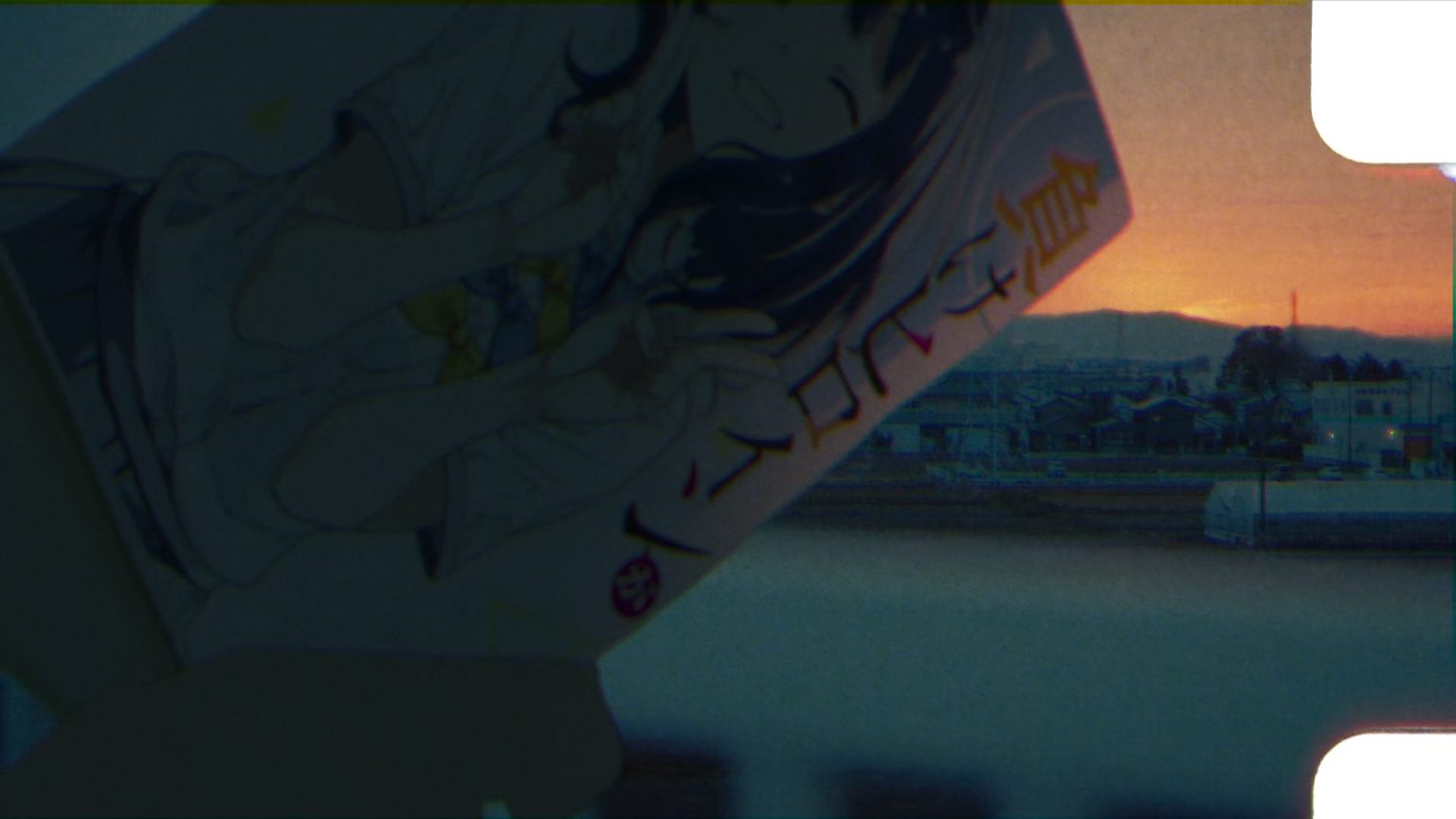
the other side of a happy story
Romance—a topic adored by all. The single most unifying force in any given situation. A daydream on a slow afternoon, a fleeting thought of love with a fictional woman—or better yet, with that distinguished person turning their head away from you. A talk on the street with a funnily dressed passerby. An older woman at the counter of a retail store. Waiting in line next to someone unoccupied. Standing in line beside someone unoccupied.
“Love is a compromise.”
“Love is finding who you want to spend the good and bad with.”
“Huh? Leave me alone.”
The billboards of New York promote diamond rings, a symbol of love, a showcase of how little money means to you in the face of pleasing your beloved other. The best sellers in bookstores, stories of people leading mundane lives and finding their golden boy, or perhaps a bit of a ‘NEW!’ twist to the same formula. Coffee is best served with someone else’s warmth beside you.
Ubiquitously, romance’s subject remains protected by sweethearts and darlings. Empty parking complexes and concrete sickness. Couples meandering in sync, unoccupied hands gently cradling the shaft of Cupid’s arrow. Fumes of nauseatingly pink vapor sticks to my sinuses.
This city is too jazzy not to be in love.
~not an angel, nor a dreamer~
The scent of virginity stains my grunge anime girl t-shirts. A 20-something year old man eating alone, avoiding the waitress’s gaze, seems unbecoming of someone in a loving relationship.
But one way or another, ‘it’ will always catch up. For instance, the paragraph above exudes an ideology on romance. The mentioning of virginity as a lack of experience for an object I am physically and physiologically given. The discretion taken when met with a woman by my lonesome, an acceptance of the other as a hidden participant in the repetition of love. Or, by happenstance, a conditioning set by run-ins with the authorities of romantique.
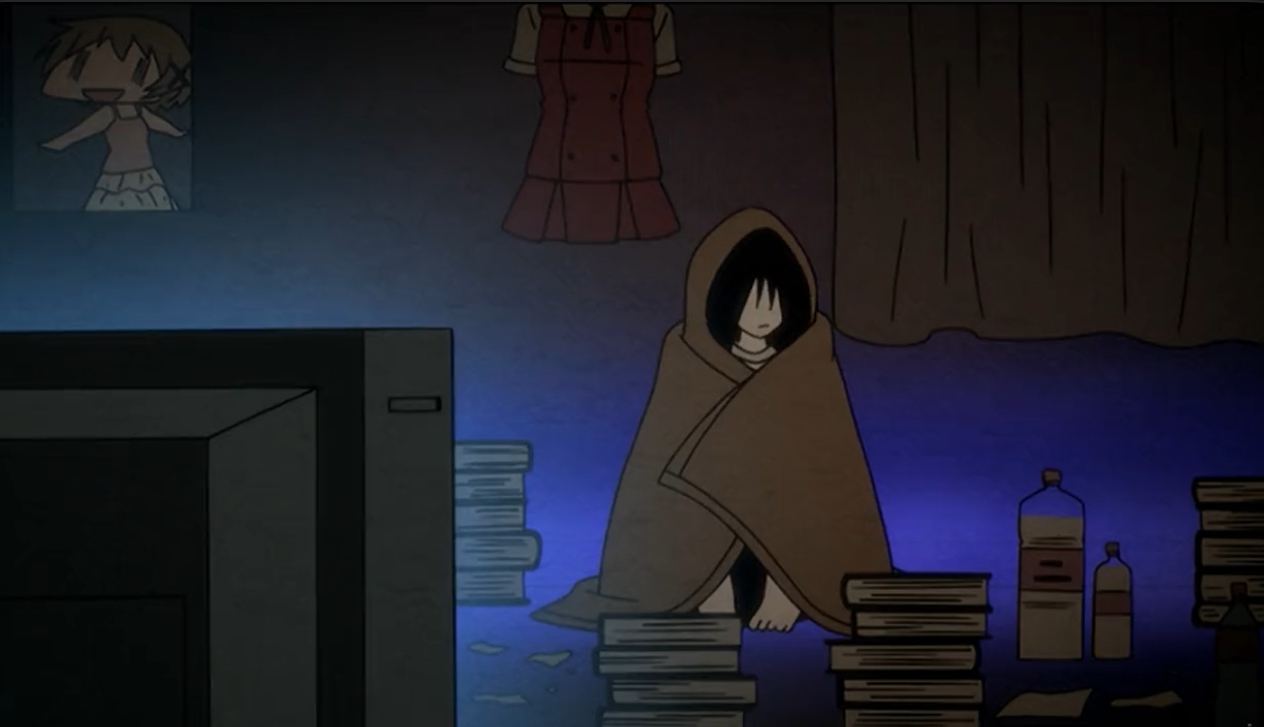
notice a pattern?
Incels are most often categorized by radically lonely men. The manosphere, the psychology of fascism, and the general feeling that there’s something more to this mythology of sex. I am not one of them, at least, to my own acknowledgments, but because I wish to retain a semblance of disgust, I am involuntarily celibate.
I must confess, I have never been in a relationship, neither interfaced through communicative technology (e-dating), nor during the extraneous social sphere of education (adolescent nonsense). It doesn’t occur to me as a site of embarrassment, but of self reflection on what love might be.
First, there is a certain comfort in disavowing natalism especially within the advent children of the connected age. Less people are going outside, more people are staying in doors and consuming TikToks and rewatching the office for the 39th time. Or doing essentially the same thing (in terms of my stagnant outside duration) but instead replaced with different things.
Obviously, I am one of those people. I simply do not date women, nor men for that matter. How could I? Suppose my childhood upbringing and the cult of social alienation I partook in had a great effect. The things I care about are easier done by my lonesome and I rarely have the time for leisure (unless I made plans for them).
There wasn’t a serious moment where I simply forgot about the will to love, but it sits upon my lap until I remember it. But for the sake of narrating a personal canon, let's say that there was a time before my social malaise; I had a clear interest in the fairer sex.
When my father and mother asked if I had anyone special in mind, my first thoughts would drift to whoever first came to my mind. The “girls I used to fall in love with”; half of their names have faded from memory by now. What I do recall, though, is that they were all active members of the cult I once served.
The social contingency of romance was first shown to me through culture, rituals, and scott pilgrim. My parents were the first people I understood the aspect of the relationship, a give-and-take interspersed with kisses. Then, observing how other star crossed lovers treated one another, seeing love defined by a viral agent much like Cupid, but instead of a transcendent romance left undefined, it works as a sort of social condition.
Romance is celebrated with open arms, in fact, it’s lauded as the highest value. An alternative goal that can supersede all else—love that can save you. Just like the positive ‘life affirming’ gaze of popular culture, Love too, is an affirmation that nurtures us and gives us something to believe in during the darkest hour.
Though, for better or for worse, I have built up the habit to never speak on these feelings, or even the positively dismissive ‘crushes’ I once told my family about. Perhaps, I have never felt the ephemeral touch of the fairy tale-esque ‘‘true love’.
This would continue to be a trend throughout all of my formative years. Find someone I deem adequate to bear my facetious feelings towards, talk about it to arouse excitement from my peers, listen to their own romance-inclined hearts and sit in my comfortable seat giving them basic advice like a virginity wizard.
Of course with all discussion contingent on a sort of “everyday being”, it risks alienating the phenomenon as if it were an equation to be flattened out. But here is where I dwell, as my own conception of romantic love is buried under layers of dejection and distance. I have been dismissive of the qualities of learning about a partner’s deepest secrets, operating with the intent to break a person down and examine their pieces, to know everything there is to know. Forgetting about the compromises of romance; the goal of a ‘forever love’. To reduce the nuance of complex human relationships to sensing, much like a drug.
Romance, as I understand it, is something that begins like a chase. A pretty woman on the side of the street, the person in your classroom that rivals your intelligence; or the meandering dream that drifts aimlessly until brushing upon the shoulder of a love-struck fool with hearts for eyes. A desire you attempt to sate, always mobilized, always yearning. The first order is this sort of ‘wanting’ is to fall victim to the fumes, the second would be beyond the pleasure principle and unto the social conditions where the ritual is actualized. Romance anime as a social phenomenon functions similarly, as eventually once the sweetie has been thoroughly coaxed after the chase, we move from the fiction of the first kiss and beginning of its practice.
Love and romance’s practice is based on repetition. The repeated messaging, the constant (just like the sky) meetings, the actions that exude the very essence of attachment and codependency (because kissing is too embarrassing(⁄ ⁄•⁄ω⁄•⁄ ⁄)⁄ . The expectation that he will bring you flowers during valentine and that you may give him chocolates on White Day. Hell, all relationships, to include those of enemies, are centered on repetition.
This reveals a segment of how beings operate in the world. Desire is lack, an unfulfilling grasping at the real; something that’s just out of your reach. The repetition of these acts (much like smoking cigarettes) dwell in entropy, an ecstatic collapse after midsummer transforms into the winter equinox. Death is a congruent figure measured through time—Each kiss becomes summer solstice, each silence a howling winter. Romance is thus the marking of time by the ephemeral, a sublime way to cope with finitude.
Nevertheless, I too have worked within the railings of romance all this time.
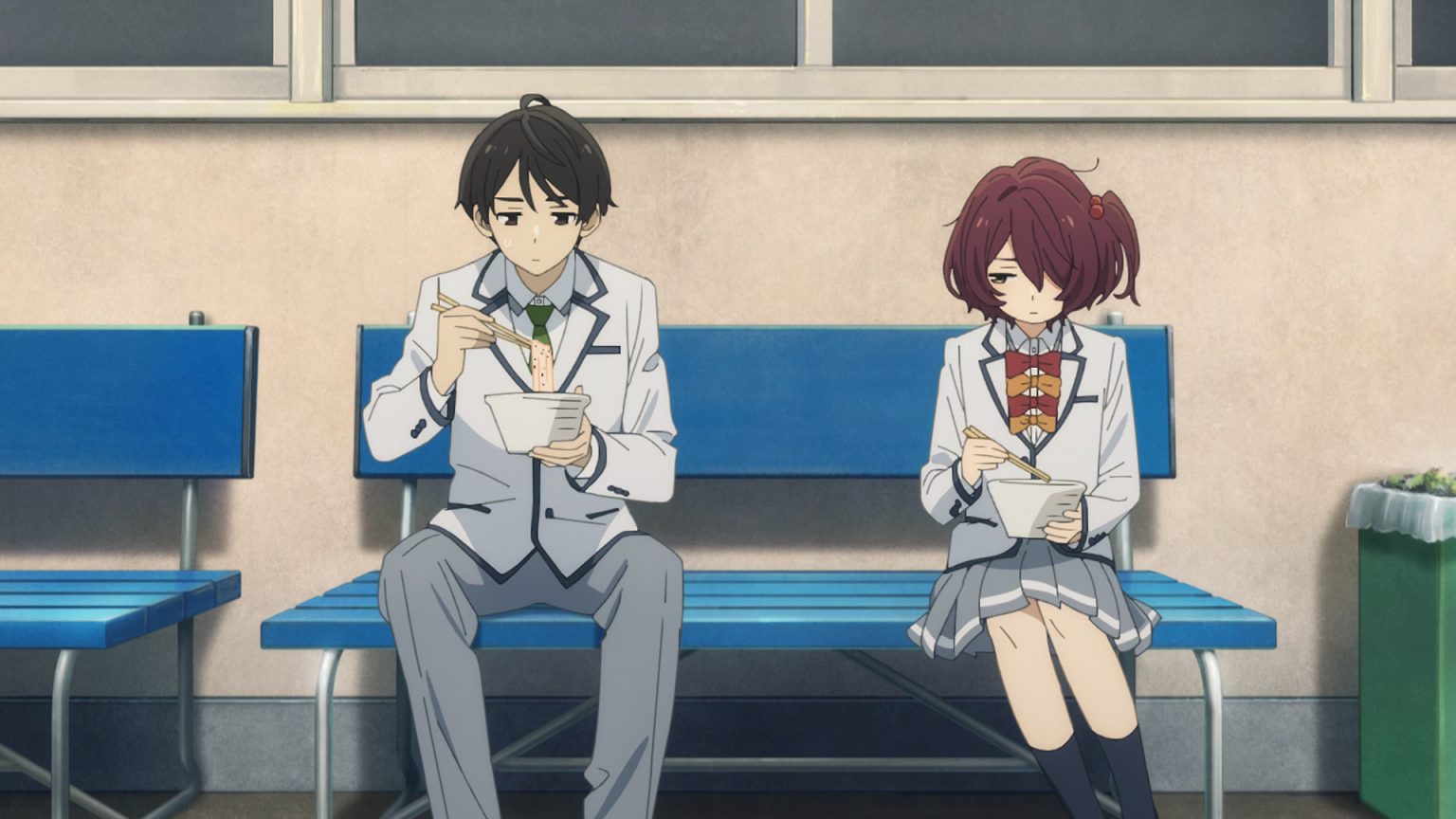
Freud would put me on cocaine.
relative relation (it’s all about)
Consider the contemporary romantic ideology of: Makoto Shinkai, a name that is hard to miss, is the director of the most popular romance works produced by modern day Japan. The director of your name. And to some really stupid people, the Miyazaki of the modern age—not that I particularly like either much.
To note my stance, I think his films are rather plain and predictable. The romantic aspects of his films are only carried by the ufotable-esque flashing colors and inadvertently pretty cinematography. To which, I am not the most accustomed because of my own preferences in sugar.
I like a drama that deals in the gritty, a real pessimistic Greek tragedy. But he has totally found his own niche and wider audiences can attune themselves to his directions. Even the most boorish films contain peculiar singularities.
Likely, the most striking aspect of his work is his reliance on aesthetics and environments to shape the eternal story of romance. The latest of his works shine with his peculiar eccentricities, with a heavy focus on the infinite natural world and the radiant horizons you might aim to catch with the apparatus of a lens.
He seeks to capture every beam of light, every interesting geometrical shape and leading lines in ordinary spaces, and especially, in what I could only describe as a detonation of the finite, subjective self.
Through the perspective of a career and future portfolio, his earliest works were a showcasing of his insights on film and the raw technical skill he has in creating a short animated film all by his lonesome. To which, the animation is breathtaking. But within this artistic vision, a sedentary action sprung forth.
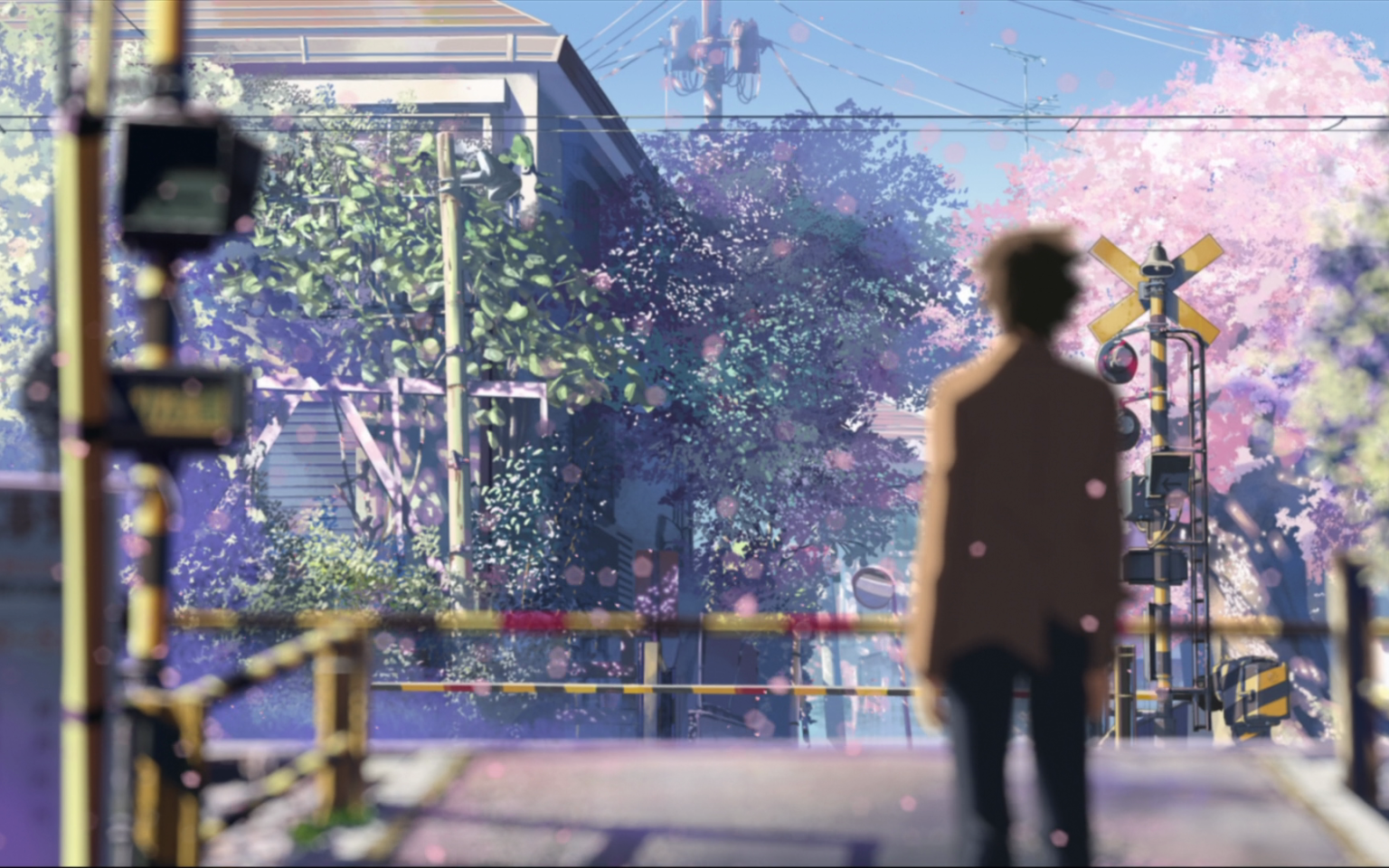
For instance, examine this simple shot from his film 5 Centimeters Per Second (or any of his samey films for that matter!).
A shot from the most impactful scene in the film, the sands of time have eroded the last bit of hope our protagonist had. The cherry blossoms were left to fall without company. But what, aside from the beauty in Shinkai’s photography, could this image hide? What implications could aesthetics for aesthetics sake hold? I ask you to forget about the narratives presented in the image and the extra lying context of the anime, and tell me what you see.
The birds are chirping, the sun is shining. Trees and cherry blossoms bloom through the mechanical constructions of man, perennial weeds. The blue sky, its lack of depth, its incessant constant. And finally, the obscured immaterial industrial signifiers framing the lack of another’s presence. And here, in the roaring tides of mawkish mass produced limits of love, Makoto Shinkai reveals the first of the thoroughgoing ailments in “a romance.” Perhaps, my conception of the natural world is one of a proper modernist. But I believe it is inevitable when viewed through the lens of romantic narratives. What could have driven the main character to bypass all of his royalties, to forget about the people in his life, to chase after the fleeting romance of Middle School’s daydream? It is irrational, precisely.
But what compels a young boy to wish for love eternal?
Because it is described as an immortal factor that transcends the physical realm. An idealist situation where the echoes of your history, if successful, produce fruitful bearings for those yet to come. Through the stories of your romance, the romance of great men, and wholesome keepsakes you might leave in a closet. The cultural epoch has reached a point where love is not merely an aspect of situation and circumstance, but is the dominant force in determining a section of your whole life. Art and music has presented its bliss with a motto, in so far as folding into itself, that it remains an eternal, deterritorialized aphorism hellbent on the formation of unknowable sensations. Your love has existed before you have and it can be said that you existed for that love.
The profundity of calling back to the utterly mundane nature, is a grasping for an actualizing force that places you into the world, inseminating the ‘once was here’ into the infinite. A desire to hide away from the only guarantee a scientifically proven life could have ever had. If life is to be described through its limits and our awareness of ‘things beyond language’, then love details a phenomena that buckles the subjective praxis in and out of congruence with those limits. Love is immortality.
Of my darling—my darling—my life and my bride,
In her sepulchre there by the sea—
In her tomb by the sounding sea.
— Poe, Edgar Allan (1849). Annabel Lee
do insects fall in love?
Plainly speaking, I believe that Love is a topic or idea that is obfuscated, barred into concepts of pathic understanding. Even without a clear definition, love’s discourse functions on a common notion of the sensations in which love arises, but in order to not appear as though I am writing about Pinterest tier deductions that romcom expectations might cause to arise, I will attempt to describe what love is to me:
Love’s main mode of expression is through a showcase of emotions and actions that signify that you truly feel the same way, but it is just as performative as it is intrinsically heartfelt. The ontological question, “What is love?” demands an answer that could be merely concluded by subjective notions on its sensations, but these answers could never truly be felt. Thus, we turn to elicit eye movements, ritualistic eros, and diamond rings to give tangible to the unknown.
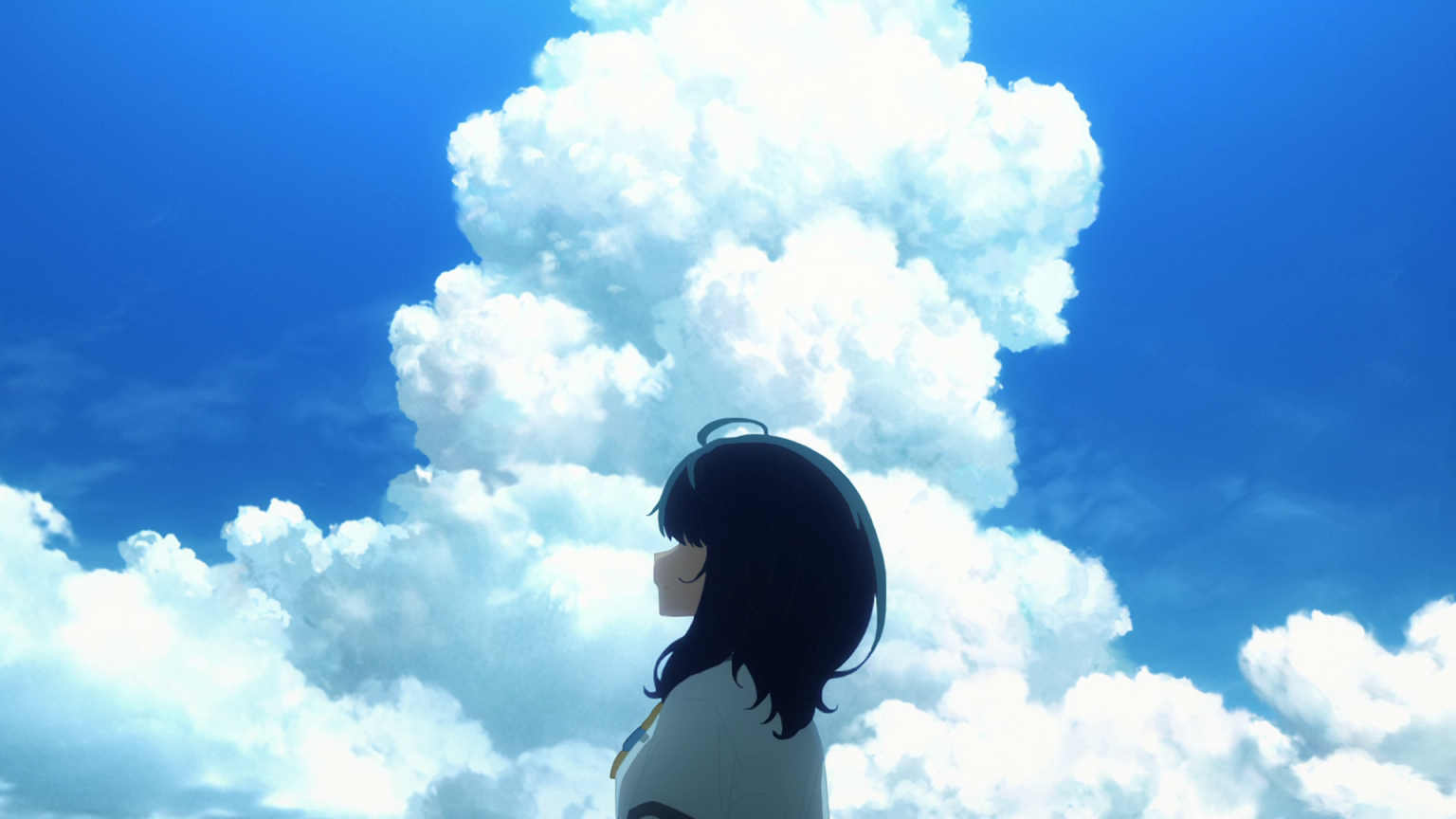
Personally, and I think I could speak for many, one of the barriers to romance is knowing when it has reached a moment of clarity, past libido and mere interest, and has bridged the gap in becoming something worth fighting for. Problems might arise from other social factors like fear and rationality, but of course, love, I think, should surmount all of these factors for a faithful freedom. A true purpose to act, if you will.
It is in my own best interest not to impose a finality where romance is prescribed, but perhaps it is that leap of faith between both parties where a romance is met. Then, if love is acted on through leaps of faith, what drives love? Like food, like shelter, why does love persist as a nexus of the human condition? Its logic could be found in multiple layers of all the romance. Take a look at the beginning act of the titular A-1 Picture production of 2024, Too Many Losing Heroines!
towards an ideology of a losing heroine

When You Stare into a Losing Heroine, the Losing Heroine Stares Back into You
As a series and a concept, it immediately prostrates itself in service of the relationship we have with anime romance and subsequently romance itself for a metatextual layer for further self-analysis. A story about someone who helps others get over their first loves, loves of which are the kinds of stories you’d have first hand accounts of in other works. But the protagonist somehow creates another self-insert you’d see from the epoch of the 2010s’ romcom? But the side characters are more lively and approachable while also already encompassing the pastiche of incel-oriented riajuu? So in a way, it’s a redefinition that treads the same ground with the only difference being the relationship we, as viewers, have with the wishful prophecies? Utterly fascinating and coherently ideological!
But the romances themselves hold the raw natalist seriousness you’d find in a random western feature film, and more importantly in otaku oriented romances. In the first chapter of the book, and the first episode of the anime, Yanagi Anna deals with the heartbreaking realization between her osananajimi and dear friend. He is in love with another girl!
After the sarcastically directed scene, she accompanies the main character and talks about her love life. Holding the self importance of a love stricken damsel, the comedy ensues when she speaks on a childhood promise of yesteryear.
“He said I would be his bride when we were in elementary.”
And with her own self-imposed altruism, she allowed her hubby to escape to his new honey.
A first love is a magical thing, probably. Was it love at first sight or should I walk past again? As children, we cling to ideas like leeches, needing hemoglobin to sustain our existence. The stressors fire off when something no longer emphasizes the individualisms of our life. Or, perhaps I should let the woman speak for herself.
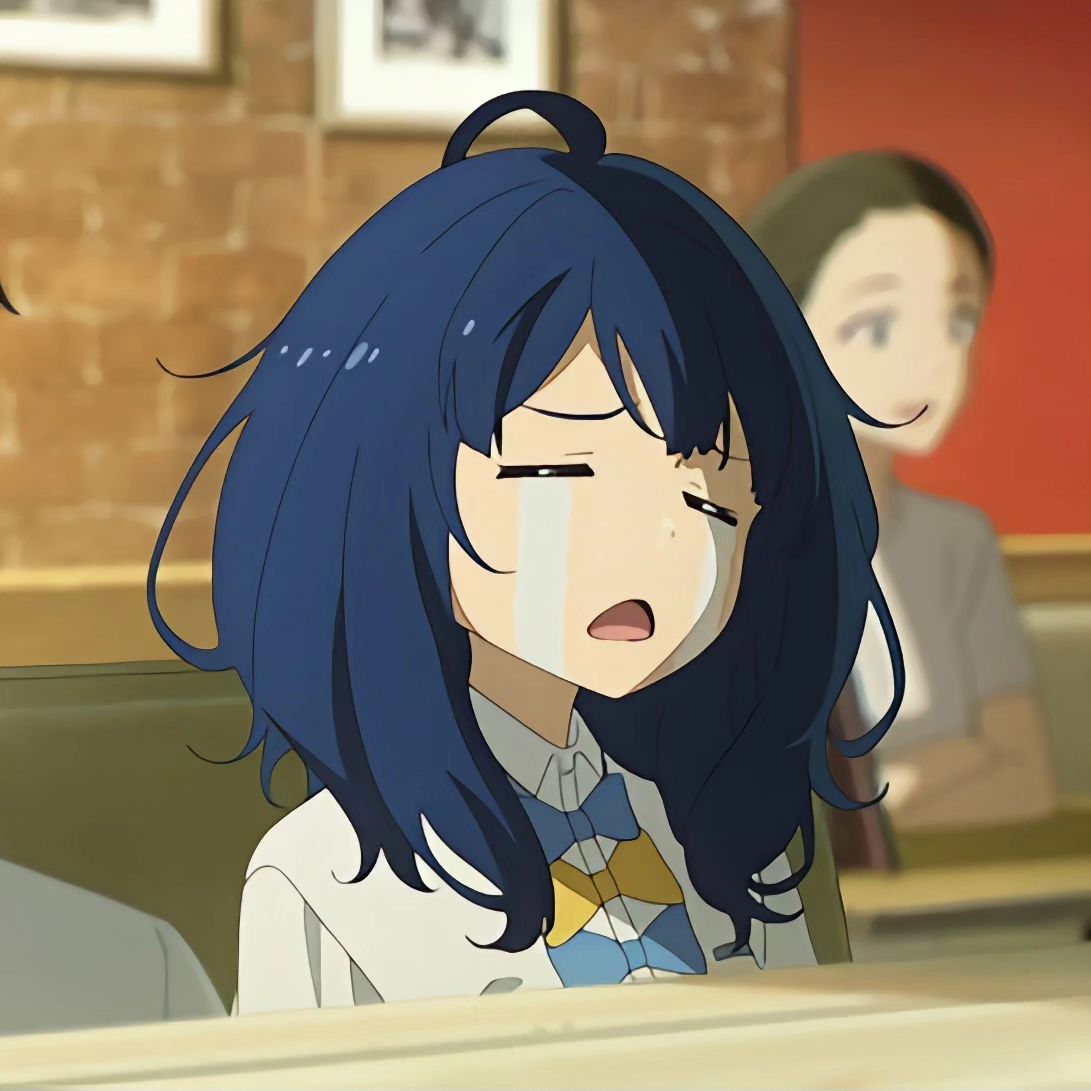
“It’s not like I have
anyone to look
good for anymore.”
She would no longer have that person to call her own, that person that she could exclaim is her lover, a person she could think about when she daydreams and spend time sprucing up to make herself prettier for him. Yanami Anna seemed to lose an aspect of her self
Because, love is centered in egoism, a mutual codependency that requires the other party to reciprocate your existence. She shows you who you are through difference. A relationship that is built on repetition with the other, both fulfilling the desire to submit to another’s will, willingly. But is not just a form of narcissistic egoism nor is it a simple transcendence into the infinite world. It is somewhere in between the idea and if it were so sinister, it would be denounced like the taste of tobacco.
Fixed identities and otherwise, are the central component in a life, if no foundations were laid, nothing could stand to remain if slighted by hindrances. Who could bear to wake if the sky no longer held in immanence, if the floor’s horizon blurred into obscurity, if every possible difference would leave into nothingness. It would spell D-E-A-T-H.
We need love, but you already knew that.
je t’aime ★ je t’aime
The capsule sways soft as a cradle, rocking us beneath a setting sun. Warm air clings to our skin, dusk in every touch.
You turn towards the window, your gaze slipping past mine.
Between heaven and earth, I wish we could transcend time.

The human limits,
the infinity of nature,
enveloping sweetness all encompassing,
an unknowable sensation beyond words,
a leap of faith,
desire, necessity, existence
The fear of (not) being dead.
Perhaps death is too simple of a word.
Perhaps the state of mortal undoing is not an end.
Beyond grey matter, beyond flesh, where the text of the dead borrows your lips just to be read aloud.
It is unknowable, it is fearful, it is cowardly, it is the ultimate.
The whole work of man yields a fear of the infinite.
Bear children—because you will die.
Work endlessly—because something must resist the reaper.
Celebrate, remember, fear, believe—because there must be something left to leave behind.
Death is the absolute, and yet it cannot be known.
What is here, is a simple difference of what wasn’t here before.
Someone else remembers.
Someone else resurrects you in the flesh of memory.
Death is no longer mysterious.
We’ve prettied it up and put it in funerals.
Romanticized it with algorithmic mourning.
Death has left the home, and death is no longer with us,
Death doesn’t matter until it's sickness rips warmth from your body.
And yet—
Obfuscating the ticking clock with perfume and nicknames.
Turning entropy into ritual, chase into repetition.
Repeating something that ends, you already participate in the infinite.
If death is a return to the infinite—
if love surpasses it—
then death is a threshold.
Love is the one thing that makes it bearable.
To love is to live with your own ending always in view.
To choose to stay anyway.
To ‘spend time,’ as if time were yours.
To give the finite the dignity of attention.
To subvert the reaper’s gaze by blushing.
Can you remember death?
Do you remember love?

Database
Bonnet, François After Death. Urbanomic / Sequence Press, 2023.
Lacan, Jacques, and Bruce Fink. Lacan on Love: An Exploration of Lacan's Seminar VIII, Transference. Polity Press, 2016.
Badiou, Alain, and Nicolas Truong. In Praise of Love. Translated by Peter Bush, Serpent’s Tail, 2012.
Shinkai, Makoto. 5 Centimeters per Second: A Chain of Short Stories About Their Distance. CoMix Wave Films, 2007.
Yūki, Hazuki, and Shirabi. Too Many Losing Heroines! Yen Press, 2024.
moechiavellian

Philosophy student with a penchant for Monster Energy™ before bed,
late night walks on the beach, and useful home appliances.
0259 in my room, out by 1600. Negentropy.
You know where to find me.
